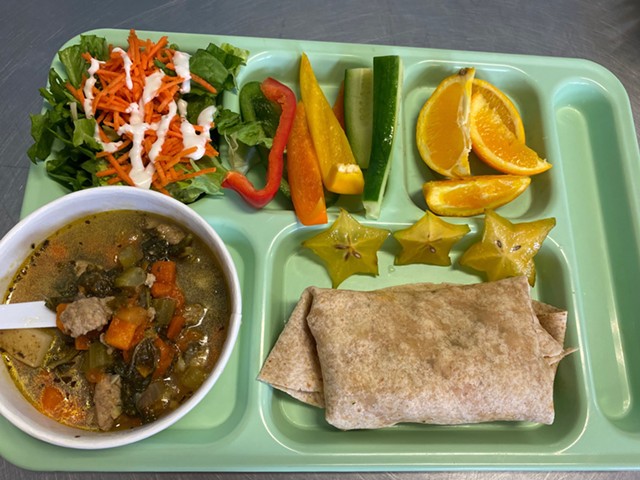
- File: JAMES BUCK
- Sixth graders at Essex Middle School in 2021
In a statement to Seven Days, Scott's spokesperson Jason Maulucci said the governor is concerned that the proposal — which comes with a cost of $29 million a year — "would increase property tax pressure, and therefore potentially rents."
That's because the money for the universal meals program would come from the state Education Fund, which gets its money, in part, from property taxes. A surplus in the Education Fund would pay for the program this year, but it's uncertain how long that money will last.
"This approach could disproportionately impact lower income Vermonters in order to essentially provide affluent families support that they do not need," Maulucci wrote. He said that over the next few days, as lawmakers pass a flurry of bills ahead of adjournment for the session, the governor will evaluate "the cumulative impact of the legislature’s many initiatives that carry high price tags" to determine which ones he can support.
Scott's administration had already come out against the proposal. Earlier this month, interim secretary of education Heather Bouchey submitted testimony to the Senate Appropriations Committee, writing that "current resources should be devoted to the highest need, and we must ensure that our education system remains sustainable into the future."
Since 2020, school meals in Vermont have been free for students, initially due to federal pandemic relief funds. State legislation passed in 2022 extended the program for one year.
Related Gov. Scott Signs Bills on Free School Meals, Mascots

Gov. Scott Signs Bills on Free School Meals, Mascots
Education
Before the pandemic, 11 percent of students who were eligible for free school meals — meaning their families were below 185 percent of the federal poverty level, or made $51,000 annually for a family of four — didn't complete the paperwork to receive those meals, according to Anore Horton, executive director of Hunger Free Vermont. Of the 31,000 students who were enrolled in the free meal program, around 32 percent weren't eating those meals.
"I think that’s a powerful indication of how profound the stigma around free and reduced meals was in Vermont," Horton said.
Now, Horton said, more kids than ever — of all income levels — eat meals provided by their school. The biggest increase has been among students who are eligible for free lunch, she said.
Around 25,000 school-age children in Vermont are in families with incomes between 185 percent and 317 percent of the poverty level — a group Horton refers to as "the missing middle." While they are not eligible for free lunch under federal guidelines, their families still struggle to pay for school meals, she said.

- Courtesy of Kathy Alexander
- A typical school meal
"I think, in general, we've changed the culture," Alexander said. "There's no stress around food access. Kids don't have think about it anymore. Everyone gets a meal."
Related How Pandemic Need, Federal Dollars and Local Collaboration Are Driving Better Ways to Help Food-Insecure Vermonters

How Pandemic Need, Federal Dollars and Local Collaboration Are Driving Better Ways to Help Food-Insecure Vermonters
Food + Drink Features
"In reality, the number of people who can afford meals every day for their kids is very small," Alexander said. "I've been waiting for this for 23 years, simply because it makes sense."














Comments
Comments are closed.
From 2014-2020, Seven Days allowed readers to comment on all stories posted on our website. While we've appreciated the suggestions and insights, right now Seven Days is prioritizing our core mission — producing high-quality, responsible local journalism — over moderating online debates between readers.
To criticize, correct or praise our reporting, please send us a letter to the editor or send us a tip. We’ll check it out and report the results.
Online comments may return when we have better tech tools for managing them. Thanks for reading.